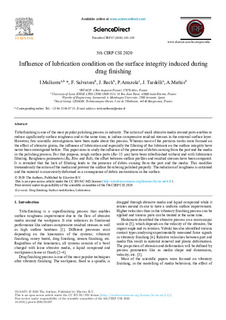| dc.rights.license | Attribution-NonCommercial-NoDerivatives 4.0 International | * |
| dc.contributor.author | ARRAZOLA, PEDRO JOSE | |
| dc.contributor.other | Malkorra Sarasola, Irati | |
| dc.contributor.other | Salvatore, Ferdinando | |
| dc.contributor.other | Rech, Joël | |
| dc.contributor.other | Tardelli, Joffrey | |
| dc.contributor.other | Mathis, Aude | |
| dc.date.accessioned | 2022-07-28T06:25:42Z | |
| dc.date.available | 2022-07-28T06:25:42Z | |
| dc.date.issued | 2020 | |
| dc.identifier.issn | 2212-8271 | en |
| dc.identifier.other | https://katalogoa.mondragon.edu/janium-bin/janium_login_opac.pl?find&ficha_no=162845 | en |
| dc.identifier.uri | https://hdl.handle.net/20.500.11984/5642 | |
| dc.description.abstract | Tribofinishing is one of the most popular polishing process in industry. The action of small abrasive media around parts enables to reduce significantly surface roughness and at the same time, to induce compressive residual stresses in the external surface layer. However, few scientific investigations have been made about this process. Whereas most of the previous works were focused on the effect of abrasive grains, the influence of lubrication and especially the filtering of the lubricant on the surface integrity have never been investigated before. This paper aims to study the influence of the presence of debris coming from the part and the media in the polishing process. For that purpose, rough surface parts (Ra~15 µm) have been tribofinished without and with lubrication filtering. Roughness parameters (Ra, RSm and Rsk), the offset between surface profiles and residual stresses have been compared. It is revealed that the lack of filtering leads to the presence of debris coming from the part and the media. This modifies tremendously the action of the media and prevent the surface from being polished properly. The reduction of roughness is saturated and the material is excessively deformed as a consequence of debris incrustations in the surface. | en |
| dc.language.iso | eng | en |
| dc.publisher | Elsevier Ltd | en |
| dc.rights | © 2020 The Authors | en |
| dc.rights.uri | http://creativecommons.org/licenses/by-nc-nd/4.0/ | * |
| dc.subject | drag finishing | en |
| dc.subject | Surface modification | en |
| dc.subject | Lubrication | en |
| dc.title | Influence of lubrication condition on the surface integrity induced during drag finishing | en |
| dcterms.accessRights | http://purl.org/coar/access_right/c_abf2 | en |
| dcterms.source | Procedia CIRP | en |
| local.contributor.group | Mecanizado de alto rendimiento | es |
| local.description.peerreviewed | true | en |
| local.description.publicationfirstpage | 245 | en |
| local.description.publicationlastpage | 250 | en |
| local.identifier.doi | https://doi.org/10.1016/j.procir.2020.02.087 | en |
| local.contributor.otherinstitution | https://ror.org/0199zgv94 | fr |
| local.contributor.otherinstitution | https://ror.org/01rk35k63 | fr |
| local.contributor.otherinstitution | Naval Group CESMAN | fr |
| local.source.details | Vol. 87. Pp. 245-250, 2020 | en |
| oaire.format.mimetype | application/pdf | |
| oaire.file | $DSPACE\assetstore | |
| oaire.resourceType | http://purl.org/coar/resource_type/c_6501 | en |
| oaire.version | http://purl.org/coar/version/c_970fb48d4fbd8a85 | en |








